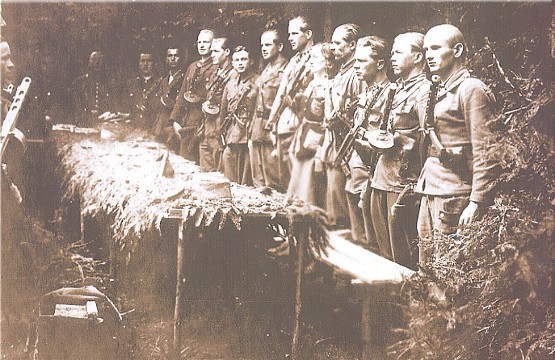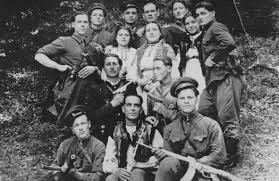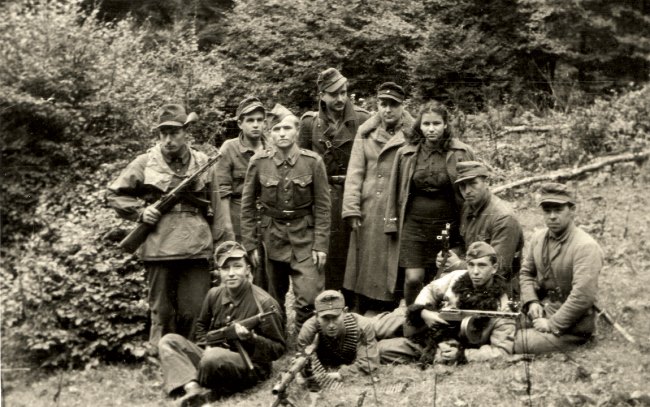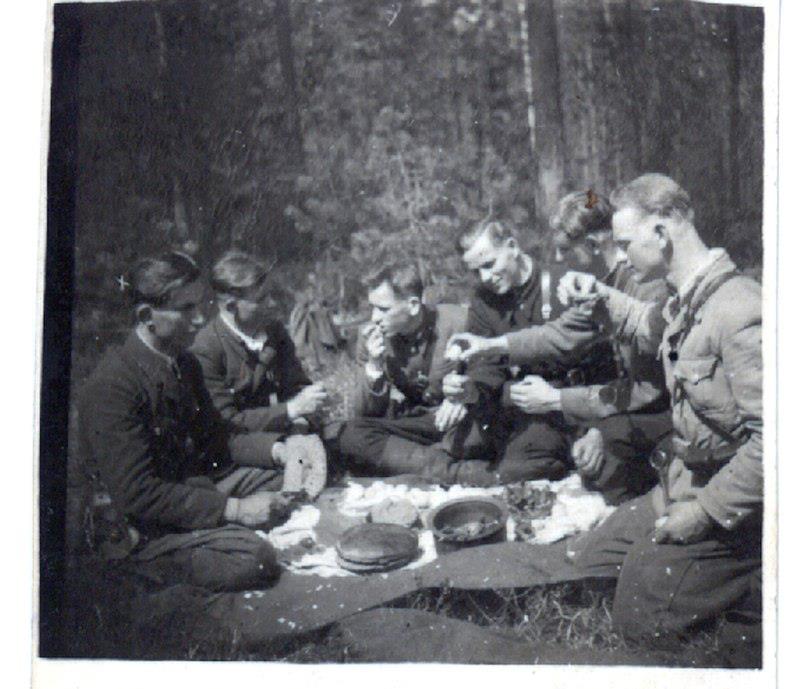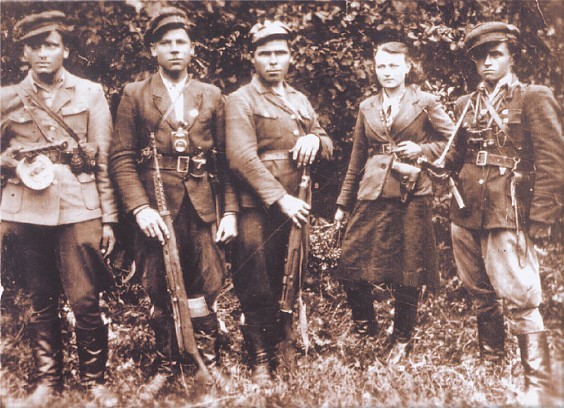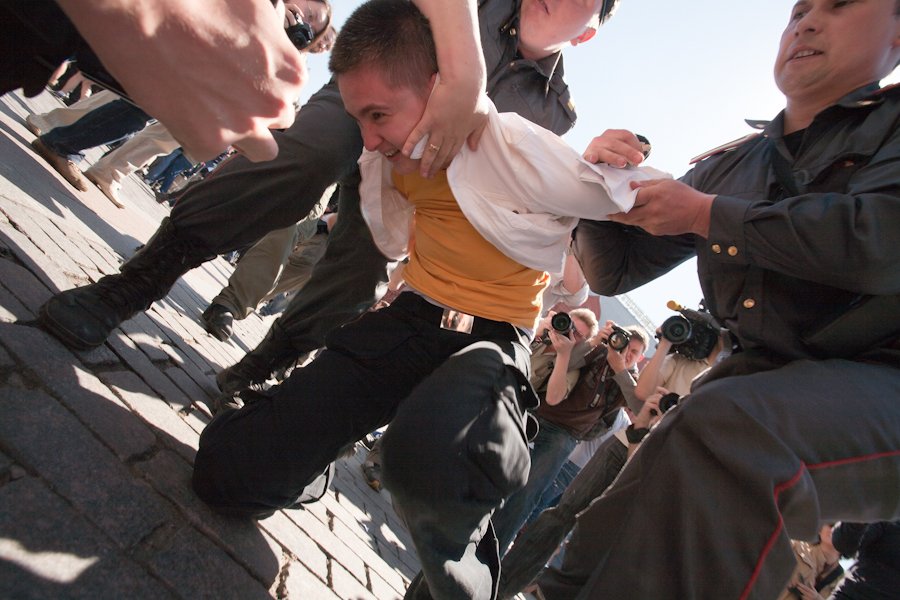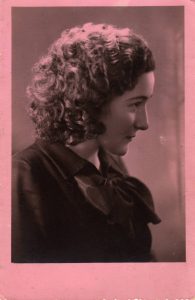 Fifth and final in a series of five memoirs written by our mother, Olha Froliak Eliashevska, Nazi death camp survivor.
Fifth and final in a series of five memoirs written by our mother, Olha Froliak Eliashevska, Nazi death camp survivor.
Our mother was born in a family of eight children in the village of Karliw (today, Prutivka), Sniatynsky Raion, Ivano-Frankivsk Oblast on December 26, 1919.
As a young Ukrainian student and political activist, she was arrested on December 11, 1943, imprisoned in Wels/Donau and Linz Gestapo prisons, and then incarcerated in Ravensbrück concentration camp (acknowledged period of detention - from December 11, 1943 to April 5, 1945).
This is the final section of her story…
On June 22, 1941, Nazi Germany launched its surprise attack against the USSR. About four months after launching their invasion, the Germans had occupied almost all of Ukraine.

In September 1941, Erich Koch, the newly-appointed Reichskommissar of Ukraine, arrived in Ukraine and soon began implementing brutal and repressive policies. Koch, a ruthless and bigoted administrator, was known for his personal contempt of Slavs.
The Ukrainian population quickly turned against the German occupation and underground resistance networks soon developed, concentrated particularly in the forests of Volyn, the swamps of Polissya and the Carpathian Mountains of Galicia.
It was in Volyn and Polissya that the first Ukrainian nationalist partisan units appeared, which became the basis for the Ukrainian Insurgent Army (UPA).
And yet: we will return
we will definitely return
at least – with our feet forward
but: not dead
but: not defeated
but: immortal
Vasyl Stus
Black smoke billowed over the forests of Volyn. Bright streaks of artillery fire flashed against the dark blue sky. The glittering stars of the Milky Way flickered from behind the darkened chasms of the night sky, while the constellations glinted across the limitless celestial heavens. The Big Dipper rolled across the sky. The sound of the night owls faded into the distant forest...
A hawk screeched somewhere high above. As it rose into the sky, its shrill lament echoed in the valley.
The group of Ukrainian partisans sat down and rested their weary heads on their knees… nameless heroes… Hanna dozed wearily by their side…
Dawn was breaking...
There was something in Hanna’s face that made you stare. She often smiled… kindly, but proudly. Sometimes, she just bit her lip silently, her hand clutching mine, whether standing at the conveyor belt of the Siemens Werke factory or in the crowd of prisoners in the factory courtyard.
She was somewhat older, with short grey hair, short legs, and eyes gleaming like those of a wildcat...
She revealed little about herself… she seemed worried, her eyes either shone with joy or darkened suddenly, like two chasms of immeasurable sadness.
“I was in the forests with the partisans... I avenged my family members”... she fell silent… because it was too difficult to speak while toiling at such exhausting work. She probably hid her grief in the dark confines of the forest.
It was clear that Hanna was suffering… she spoke slowly and solemnly; pain and anguish filled her eyes.
“They’re destroying us!” she cried, her eyes flashing wildly. It seemed to us that Hanna was in pain, climbing towards an unreachable mountain summit… her heart was beating loudly, her legs were shaking.
Staring at the sickly yellow faces of the prisoners, she proudly licked her dried lips and lowered her head. There was much anger in her heart… I so wanted to ease her pain, end her suffering…
Hanna shook her head frantically and murmured a few words indignantly: “Careful! Don’t confuse the lines of the conveyor belt!” Her fierce eyes watched me severely.
I shrank under her piercing eyes, her angry words. But then, her faded, dry face flushed with emotion. “I’m sorry. It’s so difficult for me. Forgive me. Thank you.” she whispered in my ear.
Yes, this was Hanna from the forests of Volyn - Hanna Petrivna Fedor.

Every morning, after roll call in the camp yard, we formed an Arbeits Kommando (work team) for a long day of grueling work at the Siemens Werke factory secluded in the woods near Ravensbrück concentration camp. It was located on a wide plateau, surrounded by trees and a barbed electric fence. The woods surrounding the factory rose like an impenetrable black wall.
The long column of women stumbled toward the forest. Shouting incessantly, the kapos advanced with us; the dogs barked furiously. I heard a few words, some short, effervescent phrases… It was Hanna, who was tottering behind me.
In the morning gloom, the inmates entered through the factory gate, and took their place for a twelve-hour day of grueling labour. Hanna worked beside me on the conveyor, hurriedly sorting various disks, wires, bolts, mirrors. Everything around us became blurred. The machines hummed loudly, echoing across the large room. The conveyors rolled on and on, slithering like snakes before our eyes… and the Gestapo overseers watched us intently, almost as if waiting for us to make a wrong move.
Their brutality and rage often caused a wave of revolt among the most desperate prisoners. It was immediately and mercilessly put down. We knew that a blood-soaked Gestapo hand could squeeze our throat at any time.
The whistle blew... The inmates gathered round the cauldron filled with a thin watery gruel. They stood silently, waiting for the “meal” to be served. A few lucky ones found something to chew on; their eyes gazed listlessly into the darkness.
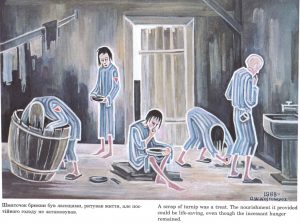
Hanna and I stood in line, tin plates in our hands, and looked at the top of the trees where the wind of freedom whistled through the branches.
Another shrill whistle… we shuffled back to the humming machines and the never-ending conveyor belt. Hours passed… the exhausted women bent over the belt, their eyes lifting only to glance quickly at the menacing overseers.
As if frightened by someone or something, the sun suddenly hid behind the gathering clouds. Lightning flashed and thunder rolled through the forest. A storm was fast approaching… it began to rain… Shrill orders : “Alle raus!” (Everybody out!).
The suffocating grey factory premises empty swiftly as we run out into the square, splashing through the muddy puddles, stumbling against the stones and tree roots, cold sweat running down our exhausted bodies.
“Stehen bleiben!” (Halt! Stand still!) cries the Gestapo officer.
We stood motionless, a bone-weary and exhausted human mass. Rain water dripped from our camp uniforms, ran down our emaciated bodies, washing away our sweat and tears... The rain had almost subsided; the red sun lingered on the horizon… twilight. The waiting began... we shivered in the cold wind... Our eyes turned to the burly Gestapo officer (“Spitzel” (sneak) - this is the name we gave him) - approaching us. He stopped… stared at the shivering women.
Suddenly, Hanna shuddered as if some mighty force had invaded her body.
“I spit in your ugly fat face!” she cried out loudly, and fell silent, probably frightened of her own voice.
We froze, our feet mired in the wet ground. Frightened eyes peeped from covered faces… I felt a strong pang in my chest; my heart started beating loudly. “Spitzel’s” face turned beet red as he jumped at Hanna so suddenly that she had no time to cry out. She swayed quietly, stunned by the heavy blow of his rubber truncheon.
Then, Hanna shuddered like an old oak tree struck by lightning. Her head fell forward as her body bent to the ground like a sheaf of wheat in the wind. A painful moan erupted from her chest, and tears poured from her eyes. Her mouth cried out some words of pain… “Spitzel” groaned hoarsely… and aimed his truncheon at her head again. Hanna sobbed loudly and fell to the ground. He muttered a few curses through his teeth, his eyes swimming with rage ... and swung his heavy boot at Hanna’s head.
The wet, muddy soil mingled with Hanna’s blood. Cold sweat streamed down our blank faces…
Shrill cries and curses filled the air… “Hande hoch!” (Hands up!) cried the enraged “Spitzel”. We raised our arms, mute with fear… but our souls had grown wings. Who will weep for Hanna? Whose soul will shed tears of blood? Our feet grasped the muddy ground tightly…
In a frenzy, “Spitzel” pulled Hanna up by her grey hair and slammed her body against the ground.
“Du elende Laus!” (You miserable louse!) ” he screamed hoarsely.
Hanna’s bloody head fell to one side… her eyes turned white. Her face was calm, proud, confident.
A bird sang softly in the nearby trees… a funeral chant for Hanna.
The kapos turned, screaming angrily at us to return to the concentration camp.
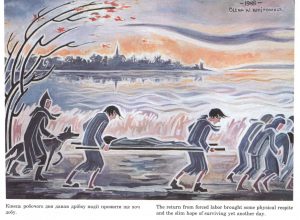
The iron jaws of the front gates clicked open… Like a river roaring through a gorge in the rocks and spilling into the open space, the dazed mass of women poured into the prison yard. Heads slumped wearily on our chests, we dragged our tired feet towards the yard, towards the camp… a vicious predatory beast lying in wait.
Hanna’s frozen body lies beyond the fir forest. Her frail figure remains before my eyes; it refuses to disappear in the surrounding haze…
Although the trees around her may seem drowsy… at her feet, life is raging…living creatures awaken, creating unique noises of freedom.
The fallen heroes have become part of the forest and lake - a refuge, a temple and a bastion of freedom.
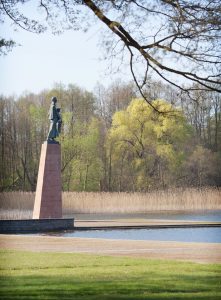
Olha Froliak-Eliashevska
Prisoner No.49061
Ravensbrück concentration camp for women
READ ALSO:
Part 1: Ukrainian women in Nazi prisons & concentration camps
Part 2: Roll call in Ravensbrück concentration camp for women
Part 3: Ravensbrück concentration camp hospital – factory of death


